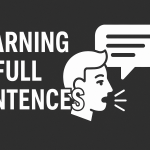Let’s consider when we should start speaking a foreign language and what influences whether it will be easy or not. After all, it is clear that in order to master a foreign language, you have to start using it in speech at some point.
When I went on my first Erasmus to Vilnius, I had already been studying English for several years, with average effectiveness. Only during my departure did I dare use it (because I had to). On the other hand, when I moved to Portugal I almost immediately came across a teacher who required her students to speak Portuguese from the very first class. The difference in the speed of language learning was beyond comparison.
Two schools of thought can be distinguished with regard to ways of learning a language.
Wait until you’re ready
According to the first, slightly older rule, we should start talking when we are “ready” for it. Just what does that mean? Do we have to wait until we have a sufficient vocabulary and knowledge of grammar to express ourselves comprehensively? Using Stephen Krashen’s terminology, the process of “language acquisition” takes time – a foreign language will form on its own if you become familiar with enough material in the language. This is analogous to how children learn.
The problem with this method is that most students give up before they develop the ability to speak. In order to stay motivated and continue learning a language for a longer period of time, we need evidence that what we are doing actually works. We need successes, even the smallest ones. If we wait 2 years until we start speaking, there is a big fear that we will give up and stop learning out of the belief that we don’t have the talent.
You might know someone who has waited for the moment to wake up one day and just start speaking a foreign language. In most cases, such a day never comes.
So what alternative do we have?
Speak from the first day
The second school of thought assumes that it is best to start speaking as early as possible, that is, even from the first day of study. Such a method has gained popularity in the last 15–20 years. One of the advocates of this method is Benny Lewis, author of the blog and book Fluent in 3 months.
To be clear, according to this idea, the idea is not to speak flawlessly, but to try to talk despite the discomfort and mistakes that are a natural part of learning in any field. According to this school, you don’t wait until you’ve “assimilated the language”; you just use what you’ve learned in a conscious way. It’s a bit like riding a bicycle for the first time, when you consciously think which way to turn the handlebars and still fall down.
In practice, this method involves preparing for specific conversations, that is, learning words and complete sentences that could actually occur in a specific situation. For example, if you are interested in cooking, you might learn words and phrases such as boil, pot, pan fry, etc. The important thing is that the topic is not new to you, and that you have something to say about it. Then you go for broke and try to talk about it for 1 minute with a native speaker. Then you learn from your mistakes and increase the conversation time to 5 minutes and then to 10 minutes. Before you know it you are able to have a conversation about cooking.
When I started learning Portuguese, I always went to the same bakery and ordered the same bread – Portuguese cornbread, or broa. Over time, as my vocabulary expanded, I started ordering other products, until eventually I could even ask what kind of bread was recommended and have a short chat with the salesman. My main motivation to finally speak up was that I had become fed up about the first kind of bread. Necessity is the mother of invention.
If you are a shy and introverted person, and are paralyzed by anxiety at the very thought of such a conversation, you are not alone. There is even a specific term – xenoglossophobia – which describes the fear of speaking in a foreign language.
Now you know about conscious and unconscious learning, and you know that other parameters such as character traits can play a role in language learning.







